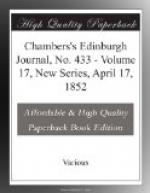’When Dyer attributes the faults of his Fleece to the Lincolnshire fens, he only awakes a smile. Keats wrote his Ode to a Nightingale—a poem full of the sweet south—at the foot of Highgate Hill. But we have the remark of Dryden—probably the result of his own experience—that a cloudy day is able to alter the thoughts of a man; and, generally, the air we breathe, and the objects we see, have a secret influence upon our imagination. Burke was certain that Milton composed Il Penseroso in the long, resounding aisle of a mouldering cloister, or ivied abbey. He beheld its solemn gloom in the verse. The fine nerves of the mind are braced, and the strings of the harp are tuned, by different kinds of temperature. “I think,” Warburton remarked to Hurd, “you have often heard me say, that my delicious season is the autumn—the season which gives most life and vigour to my intellectual faculties. The light mists, or, as Milton calls them, the steams that rise from the fields in one of these mornings, give the same relief to the views that the blue of the plum gives to the appetite.”
’Mozart composed, whenever he had the opportunity, in the soft air of fine weather. His Don Giovanni and the Requiem were written in a bowling-green and a garden. Chatterton found a full moon favourable to poetic invention, and he often sat up all night to enjoy its solemn shining. Winter-time was most agreeable to Crabbe. He delighted in a heavy fall of snow; and it was during a severe storm which blocked him within doors, that he portrayed the strange miseries of Sir Eustace Grey.’
There may be something in this supposed influence of temperature and seasons; but there certainly is no general law observable in the matter. Shakspeare asks—
’Oh who can take a fire
in his hand
By thinking of the frosty
Caucasus?
Or wallow naked in December’s
snows
By bare remembrance of the
summer’s heat?’
He might have been answered by Moore, who shut himself up in the wintry wilds of Derbyshire to write Lalla Rookh—a poem breathing of the perfumes, and glowing in the sunlight of the golden East; and by Scott, who, in Jermyn Street, St James’s, with miles of brick houses round him, produced his famous introductions to Marmion, some of which may rank with the finest descriptions of natural scenery in the language. But the way in which people are influenced seems utterly capricious. We know a writer who is always unfavourably affected by a dull, still atmosphere, and whose faculties are as invariably exhilarated by a high wind. Cloudy weather does not influence him disagreeably if it be stormy, but calm, leaden November glooms oppress him with a feeling bordering upon stupor. These are altogether unproductive days with him. If authors, however, are subject in their moods to atmospheric and other circumstantial influences, it may be expected that readers also are to some extent possessed of a like tendency. Mr Willmott has, accordingly, a suitable suggestive word or two to guide them in their reading. He says:—




